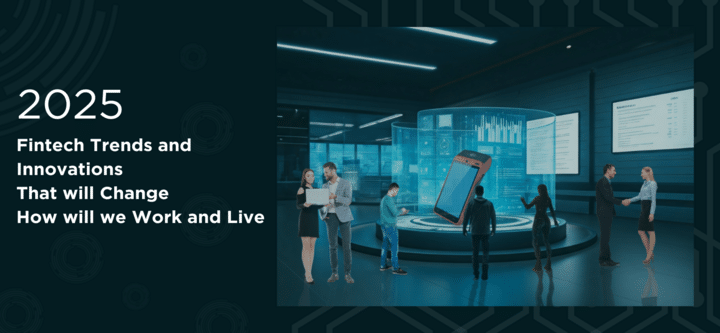As we edge deeper into the digital era, the financial technology (fintech) sector is evolving at breakneck speed. By 2025, a mix of cutting-edge innovations and user-centric trends will redefine how we live, work, and manage our finances.
In this blog, we explore the pivotal trends shaping fintech in 2025, supported by the latest statistics, research, and insights, and reveal how these changes will impact our daily lives and businesses.
1. Speed of Light Transactions: Real-Time Payments
In 2025, Real-Time Payments (RTP) are setting a new benchmark for transaction speed and efficiency. The global RTP market is projected to grow at a CAGR of 33% from 2023 to 2028, driven by the demand for instantaneous money transfers across various sectors. With initiatives like India’s UPI 2.0 leading the charge, countries worldwide are prioritizing financial inclusivity through instant payment solutions.
For instance, small businesses and gig economy workers are expected to benefit immensely from RTP systems, ensuring faster access to funds. According to a survey by ACI Worldwide, 81% of consumers in 2025 will prefer businesses offering real-time transaction options.
2. CBDCs: Revolutionizing the Currency Landscape
Central Bank Digital Currencies (CBDCs) are transitioning from experimental pilots to mainstream adoption. Nations like China and Sweden are spearheading CBDC projects, with use cases such as programmable money, instant settlements, and cross-border payments.
The Atlantic Council reports that 130 countries, representing 98% of global GDP, are exploring CBDCs as of early 2025. These digital currencies promise not just speed and convenience but also regulatory oversight and reduced fraud risk. For corporates, CBDCs open avenues for seamless B2B payments and cost reductions in treasury operations.
3. Open Banking: Collaborate to Innovate
The rise of Open Banking frameworks in 2025 is transforming customer experiences by enabling third-party access to financial data. These frameworks foster innovation by allowing fintechs and traditional banks to co-create products tailored to customer needs.
According to Statista, the global Open Banking market is projected to reach $51 billion in 2025, up from $19 billion in 2021. 65% of consumers globally are expected to use open banking-enabled apps by year-end, enhancing financial literacy and decision-making. This collaborative ecosystem paves the way for superior financial services like tailored loans, investment advice, and money management.
4. RegTech: Safeguarding Compliance in a Digital World
As regulations tighten in the financial sector, Regulatory Technology (RegTech) is emerging as the backbone of compliance in 2025. With advancements in AI, machine learning, and big data, RegTech solutions are automating risk assessments and fraud prevention.
A report by Deloitte highlights that RegTech adoption reduces compliance costs by 15–20% annually, with the market expected to reach $33 billion by 2025. For businesses, this translates to fewer regulatory penalties and streamlined operations.
5. Embedded Finance: Banking Beyond Banks
The concept of Embedded Finance, where financial services are seamlessly integrated into non-financial platforms, is gaining traction. With the rise of Banking-as-a-Service (BaaS) models, companies across e-commerce, healthcare, and even logistics are embedding payment and credit solutions into their ecosystems.
By 2025, the embedded finance market is expected to hit $230 billion, driven by consumer demand for convenience and speed. This trend enables brands to offer financial services like Buy Now, Pay Later (BNPL), loyalty programs, and instant payments without needing a banking license.
6. BNPL Expands Horizons
The Buy Now, Pay Later (BNPL) phenomenon is breaking new ground in 2025, moving beyond retail to healthcare, education, and utility payments. This evolution addresses the economic challenges consumers face, offering flexible financing solutions.
Research by Juniper highlights that BNPL transactions are expected to exceed $1 trillion globally in 2025, with a 37% increase in consumer adoption since 2023. Businesses offering BNPL options are seeing a 20% increase in sales conversion rates, emphasizing its importance in driving customer loyalty.
7. AI: The Brain Behind Fintech
Artificial Intelligence (AI) continues to dominate fintech, with applications in fraud detection, personalized financial services, and customer support. By leveraging AI algorithms, companies are delivering hyper-personalized solutions, from tailored investment plans to robo-advisors.
According to PwC, AI adoption in fintech could generate an additional $1 trillion in global GDP by 2030. In 2025, 90% of FinTech apps will integrate AI for enhanced security and user experience, making it a cornerstone of innovation.
8. Biometrics is Powering Fintech Adoption Among Masses
Biometric technologies like fingerprint and facial recognition are accelerating fintech adoption by offering secure, fast, and convenient authentication. With biometric mobile payments expected to exceed $5 billion by 2025, over 90% of smartphones now support these features.
A PwC survey shows 76% of Gen Z and Millennial users prefer biometrics over passwords. Additionally, 77% of financial institutions use biometrics to combat fraud, and by 2025, biometric authentication will account for 50% of all consumer authentication.
9. Integrated Software Solutions: One Platform, Endless Possibilities
The rise of Integrated Software Vendors (ISVs) in 2025 is helping small and medium-sized businesses (SMBs) streamline operations and payment processing. These comprehensive solutions combine invoicing, analytics, and payments into a single platform, reducing operational complexity.
ISVs are expected to grow by 20% CAGR between 2023 and 2028, with small businesses adopting them to stay competitive. By consolidating multiple functions into one ecosystem, businesses save time and boost productivity.
Business Perspective on FinTech Trends
1. Adoption of Embedded Finance
- Integrate Financial Services: Businesses should incorporate financial solutions into their existing platforms to enhance customer experience and drive revenue.
- Leverage Data Analytics: Utilize customer data to offer personalized financial products, increasing customer loyalty and retention.
2. Sustainability and ESG Focus
- Align with ESG Goals: Companies must integrate environmental, social, and governance (ESG) criteria into their business models to attract socially conscious consumers and investors.
- Innovate Sustainable Products: Develop financial products that promote sustainability, such as green loans or investment options in renewable projects.
3. Investment in Technology and Innovation
- Embrace Emerging Technologies: Businesses should invest in technologies like blockchain, AI, and machine learning to enhance operational efficiency and create innovative solutions.
- Foster a Culture of Innovation: Encourage a mindset that embraces change and experimentation to stay ahead in the rapidly evolving FinTech landscape.
Role of Evolute Fintech Innovations in a Transformative Landscape
Evolute FinTech Innovations is driving financial inclusion by harnessing technology to make banking and credit services more accessible, flexible, and affordable. Through its innovative products, Evolute simplifies digital transactions, empowering millions to participate in the financial ecosystem. This aligns with global efforts to reduce the unbanked population, fostering individual economic upliftment.
By prioritizing inclusivity and leveraging technology as an enabler of growth, Evolute contributes to national and global economic stability. With a vision of “Techpowering the World,” the company focuses on creating solutions that bridge gaps, empower individuals, and promote sustainable progress.
Conclusion: The Fintech Frontier in 2025
As fintech innovations reshape the financial world, they hold the potential to profoundly impact every aspect of our lives. Here’s a quick summary of 2025’s most exciting fintech trends:
- RTP ensures instant, global payment capabilities.
- Blockchain drives transparency and security.
- CBDCs revolutionize how we perceive and use money.
- Open Banking fosters collaboration and personalized services.
- RegTech automates compliance and fraud prevention.
- Embedded Finance integrates banking into everyday platforms.
- BNPL expands to essential sectors.
- AI personalizes and secures financial experiences.
- ISVs streamline SMB operations with integrated solutions.
With these advancements, 2025 promises to be a transformative year for fintech, fostering innovation and inclusivity. At Evolute Fintech Innovation, we’re excited to be part of this journey, driving solutions that redefine the future of finance.





